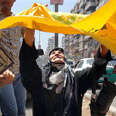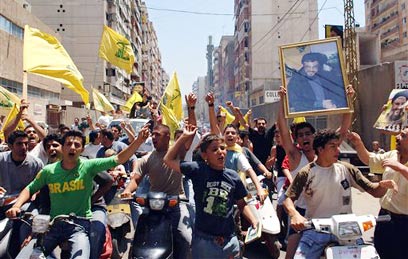
In Lebanon: Celebration and condemnation
Arabs from around world shown on Hizbullah TV al-Manar praising attack, kidnapping of IDF soldiers as joyous victory, pride for Arab world. But in Lebanon Nasrallah came under greater criticism: ‘Decisions of war and peace should only be made on state level,’ former president protests
In between steady news broadcasts and footage of a speech by Hizbullah Secretary General Sheikh Hassan Nasrallah, “conversations with viewers” showed civilians crying with joy, reading poetry, yelping with glee, calling out cries of support, and displaying all manner of happiness and pride.
“Excuse me,” Kholod, a Saudi Arabian woman, said as she broke out in tears on the live broadcast. “This is a joyous moment for me.” After recovering a moment or two later, she read lines of poetry with an Islamic bent to praise the “heroism” of Hizbullah for their “enormous achievement.”

Cartoon from Arab newspaper al-Watan
And she was not the only one. Jamil from Denmark also read lines of poetry, and Ali from Germany said, “This gives great pride to Arabs and is Allah’s victory (in Arabic – Nasr-Allah).”
Samer from Syria said: “I celebrated today. We are looking forward to a victory soon, god willing,” and Rukieh from Australia sent her blessings from the Muslim community on the distant continent to Hizbullah and its leader Shiekh Nasrallah. “We bless you and this courageous operation, which makes you and us hold our heads high,” Majdi from Nablus said. And as spirits were still soaring, Nasrallah took the podium and in a boastful speech which promised to “surprise Israel” if it should choose the military option.
Is support so widespread?
Al-Manar is not considered a particularly serious TV station, loaded with propaganda broadcasts. But it was difficult not to be impressed Wednesday by the numerous and varied expressions of support for Hizbullah coming from so many locations around the world. Civilians blessed the great pride the event gave Arabs "on this holiday," but not civilians alone – former Lebanese Prime Minister Salim al-Hoss, members of parliament, journalists and columnists all hurried to praise the accomplishment.

Celebrations on the streets of Beirut (Photo: AP)
Is this the reality? Is support for Hizbullah so widespread or is this only manipulated propaganda and nothing more? “In the Arab world there is a feeling of weakness and degradation, not only in terms of what is happening between Israel and the Palestinians, but in everything associated with the United States, and therefore any expression of strength inspires happiness among a great deal of the public,” said University of Tel Aviv President and Mideast expert Prof. Itamar Rabinovich.
“Much of the Lebanese public, not to speak of the entire Arab world, are included in this – we are not speaking of an insignificant minority. This can also be seen among Palestinians in the fact of Hamas’ victory in the elections. It can be assessed that the various Muslim Brotherhood groups would win in many countries if democratic elections were held,” Rabinovich noted.
Others critical
But not all press and politicians were in agreement. Recently, Lebanon has found itself in a state of internal political crisis which it is trying to bridge through “national discussion” in order to reach understandings. Discussions, however, have been deadlocked for some time, in part due to demands by Druse leader Walid Jumblatt and others to disarm Hizbullah.
Therefore, even if such a united front was displayed in certain media outlets, the rest of Lebanon does not necessarily share these sentiments. Various channels piped up with disapproval of the Hizbullah attack just hours after it took place, and more severe criticism was heard as well from the divided Lebanese leadership.
Thus, for example, former Lebanese president Amin Gemayel strongly censured the operation. “Decisions of war and peace are decisions made on the state level exclusively. It doesn't make sense that Lebanon should be forcedinto war under conditions and at a timing that don’t suit its national interests. No one has the right to complicate Lebanon in such escapades,” he said openly, but his words were met with immediate criticism.
Parliament member Boutros Harb was also not shy to criticize. “What happened in the south is surprising, and occurred at a sensitive and inappropriate time, while we are in the height of the summer months. We must decide who has the right to make decisions on war and peace in Lebanon. Is that right reserved for the Lebanese people and its legal institutions, or is the choice in the hands of a small minority of Lebanese people?” he demanded.
'Why didn't you wait for united front?'
“Did you take into account the damage to Lebanon and its economy, which cannot absorb the crisis?” Nasrallah was asked directly by a recalcitrant journalist during a press conference. “Of course we took it into account but there are other issues here. Every Lebanese mother sees herself as the mother of Samir Quntar (Lebanese prisoner held in Israel). Everything on the material level can be fixed, but on the human level – not necessarily,” Nasrallah responded, visibly embarrassed by the question.
“Why didn’t you wait for a united stance in Lebanon before hastening to carry out the operation?” another journalist demanded. “Because if we waited for understandings we could have waited 100 years,” Nasrallah tried to justify.
But as it typical of Nasrallah, even in euphoric moments he keeps his political senses sharp. As the leader heading an organization which draws its power from popular support, Nasrallah knows it is better to occupy the gray area rather than bring about an internal political crisis in Lebanon which could relegate him to the margins. In this regard, he signaled to his political rivals: “We separate the matter of prisoners and the release of prisoners from every other intra-Lebanese issue. This is the time for solidarity. He among the country’s leaders who won’t stand by us now – is standing with the enemy,” he said.
Will Nasrallah thus succeed in circumventing severe public criticism from Lebanon? It appears that he will not. If the situation can be judged on past experience, severe criticism and political pressures are in the cards. Or as Professor Rabinovich summed up: “In the same Lebanon where Hizbullah has so many supporters, about a year ago a quarter of a million Lebanese came out to the streets following the assassination of Rafik Hariri and demanded Syria withdraw and their Hizbullah allies be disarmed. This is Lebanon.”










